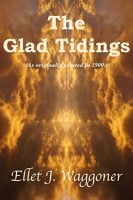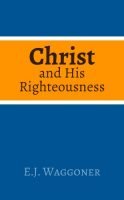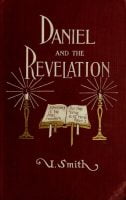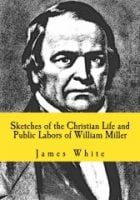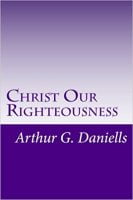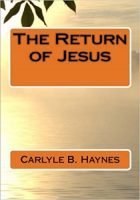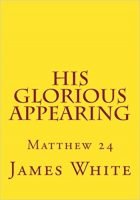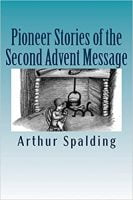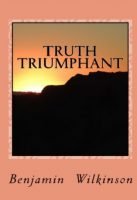A small selection of pioneer writings follows. If you’ll visit the links here, you’ll also find links to other books – especially if you visit the Author pages.
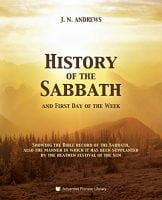 History of the Sabbath and First Day of the Week, by J. N. Andrews, written by the very first Seventh-day Adventist biblical scholar remains a valuable resource, and I can hardly believe it is now available in Kindle format! It’s in our library in rebound hardback, but the next time I want to look something up, I think I’ll download the Kindle version, since that is so searchable! And this does appear to be a proper Kindle version, rather than a mere scanned book, as is the case for many old books. (I admit I haven’t read every word of this book, but do know that it is still a good book. After all, history doesn’t change. Only the editing and interpreting of history does. And more modern interpretations often veer farther and farther from the actual historical facts.)
History of the Sabbath and First Day of the Week, by J. N. Andrews, written by the very first Seventh-day Adventist biblical scholar remains a valuable resource, and I can hardly believe it is now available in Kindle format! It’s in our library in rebound hardback, but the next time I want to look something up, I think I’ll download the Kindle version, since that is so searchable! And this does appear to be a proper Kindle version, rather than a mere scanned book, as is the case for many old books. (I admit I haven’t read every word of this book, but do know that it is still a good book. After all, history doesn’t change. Only the editing and interpreting of history does. And more modern interpretations often veer farther and farther from the actual historical facts.)
In J. N. Andrews’ The Judgment: Its Events and Their Order, we can see just how the pioneers taught this important subject. (I think we may have a better way of teaching the same truths now.)

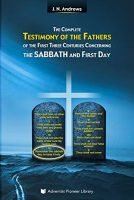 A Vindication of the Seventh-day Sabbath, by Joseph Bates, is also available for free in Kindle format, but it’s likely not in the modern typeset available in the re-published paperback version.
A Vindication of the Seventh-day Sabbath, by Joseph Bates, is also available for free in Kindle format, but it’s likely not in the modern typeset available in the re-published paperback version.
The Complete Testimony of the Fathers of the First Three Centuries Concerning the Sabbath and First Day, by J. N. Andrews would be a valuable book for those interested in early statements regarding the Sabbath after the death of Christ. The fact that it is available in Kindle format makes it just so much more attractive. (Also available in hardback, looking very similar to the original version.)
You know that “gospel” means “good news,” don’t you? And in the KJV, Isaiah 61:1, we read prophetically of Christ that “The Spirit of the Lord God is upon me; because the Lord hath anointed me to preach good tidings unto the meek; he hath sent me to bind up the brokenhearted, to proclaim liberty to the captives, and the opening of the prison to them that are bound.”
And it is from this that E. J. Waggoner got the title of this study of the book of Galatians, written at a time when much of the church was mired in legalism. Waggoner’s book was and is still a breath of fresh air presenting the “glad tidings” of Christ our righteousness. Order the 1900 edition or the revised edition.
In his famous book, Christ and His Righteousness, E. J. Waggoner writes on the theme of the 1888 message. If you wonder what was really taught in
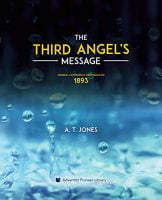 When we remember E. J. Waggoner, we generally connect him with A. T. Jones who was also prominent in teaching the 1888 message of righteousness by faith. The Third Angel’s Message by A. T. Jones is a sermon series from the 1893 General Conference Session which Ellen White encouraged him to print as a book because she saw that this book would be useful, especially to new believers.
When we remember E. J. Waggoner, we generally connect him with A. T. Jones who was also prominent in teaching the 1888 message of righteousness by faith. The Third Angel’s Message by A. T. Jones is a sermon series from the 1893 General Conference Session which Ellen White encouraged him to print as a book because she saw that this book would be useful, especially to new believers.
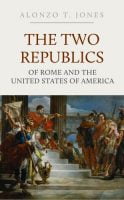 While we remember Alonzo T Jones mainly as the “Jones” of the Waggoner and Jones team of the 1888 General Conference session, A. T. Jones was better known in his time as a champion of religious liberty. It was a topic on which he spoke often, not just in churches but in government assemblies. It was his interest in religious liberty that likely led him to write The Two Republics of Rome and the United States of America.
While we remember Alonzo T Jones mainly as the “Jones” of the Waggoner and Jones team of the 1888 General Conference session, A. T. Jones was better known in his time as a champion of religious liberty. It was a topic on which he spoke often, not just in churches but in government assemblies. It was his interest in religious liberty that likely led him to write The Two Republics of Rome and the United States of America.
Of all the pioneer writings, Uriah Smith’s book, Daniel and the Revelation, a verse-by-verse study, probably enjoys the widest distribution even now. Perhaps that is because Ellen White encouraged its distribution. She did not, however, say that this book was the last word on the subject, but she encouraged us to keep studying. Thus we have learned more about the books of Daniel and Revelation that Uriah Smith knew, especially about Revelation chapters 4 & 5. But the book still offers a valuable perspective for Adventists who value the historicist method of interpretation. (That means that we see prophecy rooted in the past, with fulfillment beginning before our time in such a way that we can with greater confidence interpret prophecies yet unfulfilled.)
James White’s writing of Miller (Sketches of the Christian Life and Public Labors of William Miller) gives much light on the history of the Adventist movement. William Miller was instrumental in preaching about the end of the 2300-day prophecy as recorded in the book of Daniel in the Bible. He was the most prominent of preachers on the topic in America. His Bible can be viewed at the Center for Adventist Research (an important component of the White Estate) in the basement of the James White Library at Andrews University. The Miller farm is also owned and managed by the White Estate and is open to visitors.
In 1888 The Seventh-day Adventist church realized its message had drifted away from Jesus Christ and had become excessively focused upon the requirements of God’s unchanging law. Christ Our Righteousness, by A.G. Daniells, describes the historical event and includes a comprehensive outline of the Scriptures that supported the need for change. Also included are counsels from Ellen White written before and after the decisions were made to place the life of the Savior, the cross and salvation at the center of all religious dialogue.
Originally printed in 1926, the paperback edition has been re-typed for improved readability, and an index has been added. See also Cristo Nuestra Justicia.
To comprehend the meaning of the words “God is Love” is to know God and Jesus Christ.
God is Love, by George E. Fifield, written in 1897, is relevant today. It helps the reader understand the acts of God that seem less than loving. It describes why there must be a final judgment and why there will be judgments of suffering before the Second Advent of Jesus. This version has been reset using a modern font. It is not a photo or “scanned” copy.
“The Return of Jesus” by Carlyle B. Haynes contains a Proclamation of the Bible Teaching Regarding Our Lord as the Seed Promised to Our First Parents, the Jehovah Angel of the Patriarchs, the Deliverer of His People, the Messiah of the Jews, the Redeemer of the World, the Lamb in the Midst of the Throne, the Great High Priest Standing Before God, the Mediator Between God and Man, and the Coming King; Together with an Explanation of the Bible Predictions Regarding His Return, with Particular reference to the Signs of the times Which Demonstrate the Imminence of His Second Coming. This book has been retyped and printed in a modern font.
His Glorious Appearing by James White is a compelling review of the 24th chapter of the gospel of Matthew. This book will reconnect the reader with the zeal of the Advent Pioneers as you are lead through this important chapter of the New Testament. James White’s descriptions and analysis is still relevant as he provides a verse-by-verse commentary with detailed explanations. You will be encouraged as you read this book and review the important words of Jesus that are so important for us today.
Pioneer Stories of the Second Advent Message by beloved story teller Arthur Spalding contains stories of the men and women who experienced the great disappointment of 1844, and who persevered with Bible study to learn the meaning of Bible Prophecy. This book has been retyped in a modern font and is a great read for children who will be leaders in these last days. This book will instill a zeal in each reader to finish the important work that the pioneers of our church began.
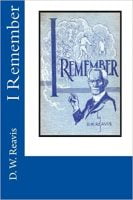 I Remember, by D. W. Reavis – Memoir of Seventh-day Adventist pioneer who attended Battle Creek College in 1875. While living with an aunt after the Civil War, he became an Adventist. He assisted in many evangelistic tent meeting campaigns and for many years was the circulation manager for the Review and Herald. His book “I Remember” is an exciting read that was summarized in a six-part series published in The Guide in 2015.
I Remember, by D. W. Reavis – Memoir of Seventh-day Adventist pioneer who attended Battle Creek College in 1875. While living with an aunt after the Civil War, he became an Adventist. He assisted in many evangelistic tent meeting campaigns and for many years was the circulation manager for the Review and Herald. His book “I Remember” is an exciting read that was summarized in a six-part series published in The Guide in 2015.
Truth Triumphant by Benjamin Wilkinson is a classic history of the church in the wilderness. Wilkinson provides detailed information about the surviving records that describe the Christian church, comprising thousands of members in dozens of countries. They worshiped on Sabbath, used the Greek Bible and translated into various languages. This continued until the Roman church expanded and enforced Sunday worship via laws and the inquisition.
While some discredit it for lack of of corroboration in mainstream history, let the reader consider that mainstream history has been controlled by a certain religious entity for hundreds of years. Judge by the evidence the author presents. This edition has a NEW 37-page Topical Index!
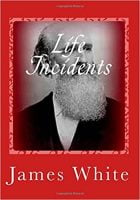 In Life Incidents, James White’s autobiography, he describes how he began his ministry with very little education. Read his own words as he describes the challenges of the 19th century and early Adventism as he followed his calling with few resources and abundant zeal. This book is NOT a scanned copy but reset with modern fonts.
In Life Incidents, James White’s autobiography, he describes how he began his ministry with very little education. Read his own words as he describes the challenges of the 19th century and early Adventism as he followed his calling with few resources and abundant zeal. This book is NOT a scanned copy but reset with modern fonts.
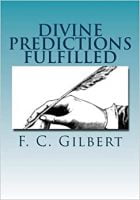 Divine Predictions Fulfilled contains the predictions of Ellen White described and discussed by her contemporaries – why they believed in her gift, and how they were used to advance the Lord’s work. (This reprint is retyped with a modern font.)
Divine Predictions Fulfilled contains the predictions of Ellen White described and discussed by her contemporaries – why they believed in her gift, and how they were used to advance the Lord’s work. (This reprint is retyped with a modern font.)
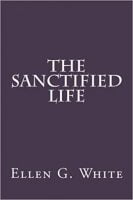 In 1881 Ellen White published a series of eleven articles about sanctification in the Review & Herald. At the time there were many popular opinions regarding the subject to which she addressed. Today some say that to attempt sanctification is futile and in The Sanctified Life she addresses the subject in a thorough manner. This book examines the lives and characters of Daniel and the Apostle John. It explains the importance of personal prayer and following our model-Jesus Christ.
In 1881 Ellen White published a series of eleven articles about sanctification in the Review & Herald. At the time there were many popular opinions regarding the subject to which she addressed. Today some say that to attempt sanctification is futile and in The Sanctified Life she addresses the subject in a thorough manner. This book examines the lives and characters of Daniel and the Apostle John. It explains the importance of personal prayer and following our model-Jesus Christ.
“Life Sketches” describes the life story of Ellen White who is one of the most widely read of all time. Her writings have influenced world leaders and have guided millions to a higher spiritual level. She wrote this book in response to the many who wanted to know of her early life. This book will inspire all who read it.
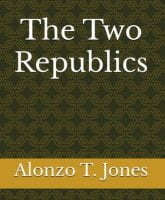 The Two Republics: or Rome and The United States of America,, by Alonzo T. jones, compares the history of the two greatest Republics and the relevance of their actions to Sabbatarians. Jones traces the history of Sunday worship and the steady corruption of the Roman Catholic system and how it still seeks power to further its interests. America’s first Sunday law, passed in 1892 and signed by President Harrison, is described in detail – a “must read” for those who think it could never happen. This is the 1894 edition republished using a modern font.
The Two Republics: or Rome and The United States of America,, by Alonzo T. jones, compares the history of the two greatest Republics and the relevance of their actions to Sabbatarians. Jones traces the history of Sunday worship and the steady corruption of the Roman Catholic system and how it still seeks power to further its interests. America’s first Sunday law, passed in 1892 and signed by President Harrison, is described in detail – a “must read” for those who think it could never happen. This is the 1894 edition republished using a modern font.
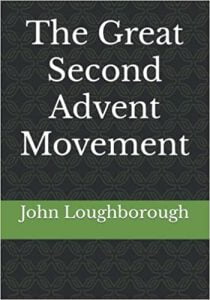 The Great Second Advent Movement by John Loughborough – This NEW edition contains an expanded Topical Index. Loughborough writes the history of the Seventh-day Adventist work as he saw and experienced it. He joined the small movement with his call to ministry near Rochester, New York while still a teenager.
The Great Second Advent Movement by John Loughborough – This NEW edition contains an expanded Topical Index. Loughborough writes the history of the Seventh-day Adventist work as he saw and experienced it. He joined the small movement with his call to ministry near Rochester, New York while still a teenager.
After joining the Sabbath-keepers, he worked under the direction of J. N. Andrews and James White before maturing and becoming the first to be ordained as a Seventh-day Adventist Minister.
His experiences demonstrate repeatedly how the Lord led this movement and people following the examples of the Apostles, spreading the message throughout the world.
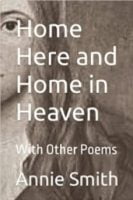 Home Here and Home in Heaven With Other Poems by Annie Smith, sister of Uriah Smith. This book is the 1855 edition and has been reproduced using a modern font for convenience. Ms. Smith’s poetry and hymns convey the enthusiasm and faith of the early Advent Movement. Three of her songs are in the current Seventh-day Adventist Hymnal. When James White was absent on trips, she had charge of the editing process at the Review and Herald Publishing Company. She was educated as a teacher of Oil Painting and French.
Home Here and Home in Heaven With Other Poems by Annie Smith, sister of Uriah Smith. This book is the 1855 edition and has been reproduced using a modern font for convenience. Ms. Smith’s poetry and hymns convey the enthusiasm and faith of the early Advent Movement. Three of her songs are in the current Seventh-day Adventist Hymnal. When James White was absent on trips, she had charge of the editing process at the Review and Herald Publishing Company. She was educated as a teacher of Oil Painting and French.
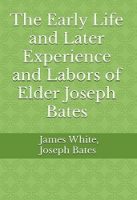 The Early Life and Later Experience and Labors of Elder Joseph Bates published in 1877 by James White five years after Elder Bates’ death is an important view of the man who introduced the Sabbath Message to the Advent Community. The first two-thirds of this book describes his early life and character development as a seaman. The remainder of the book is primarily about the 1844 message and his involvement with its spread.
The Early Life and Later Experience and Labors of Elder Joseph Bates published in 1877 by James White five years after Elder Bates’ death is an important view of the man who introduced the Sabbath Message to the Advent Community. The first two-thirds of this book describes his early life and character development as a seaman. The remainder of the book is primarily about the 1844 message and his involvement with its spread.

